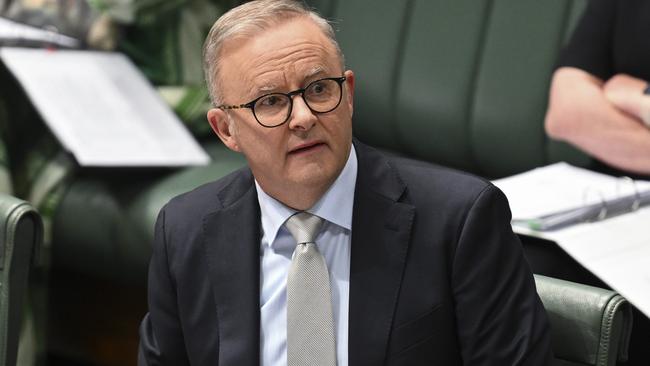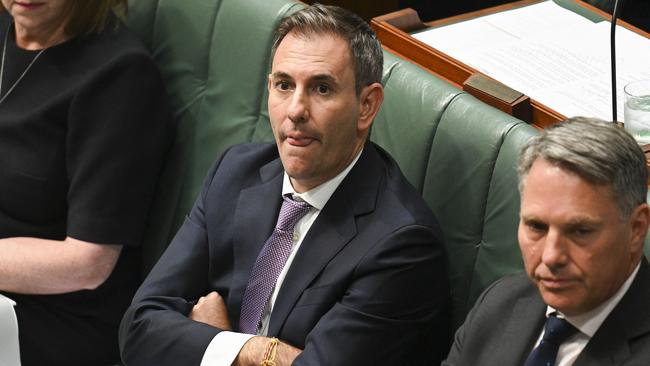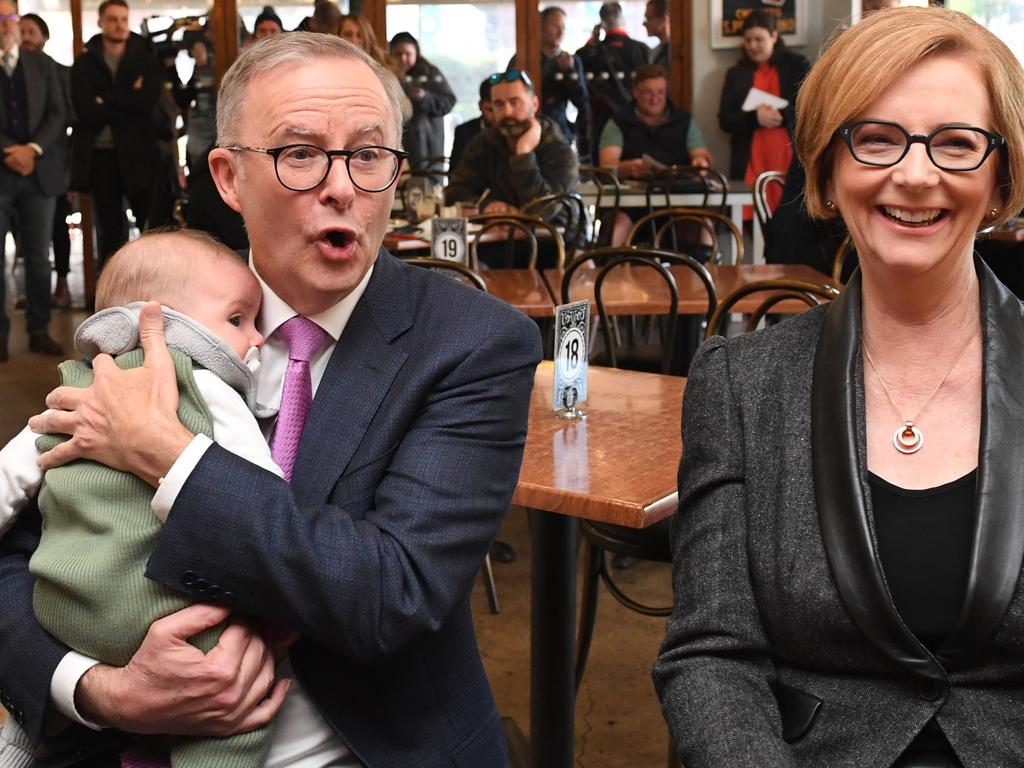Business launches pre-budget fight with PM as Australia falls behind
Australia’s largest employers begin a pre-budget attack over economic reform inertia, raising pressure on the PM to reverse a crash in investment and global competitiveness.

Australia’s largest employers have launched a pre-election attack over Labor’s economic reform inertia, ramping up pressure on Anthony Albanese to reverse a crash in investment and global competitiveness that has forced companies to slash jobs, halt projects and move offshore.
As productivity and investment levels remain stagnant ahead of Saturday’s crucial Dunkley by-election in Melbourne, the Business Council of Australia has told Jim Chalmers to cut spending and regulation, implement a single payroll system and restore the Coalition-era tax-to-GDP cap.
In its “reclaiming our competitiveness” pre-budget submission to Treasury, the BCA says the Treasurer must cap real expenditure growth at an annual 2 per cent and implement more realistic economic and commodity price forecasting.
Following a bruising battle over the Prime Minister’s union-backed industrial relations shake-up and looming fights over tougher environmental and emissions rules, business leaders have warned ahead of the May 14 budget that Australians’ “quality of life is at stake”.
With the nation tumbling from fourth to 19th in global competitiveness rankings since 2004, the BCA has sounded the alarm on slow-moving reforms and governments avoiding hard decisions, as economic growth flatlines and G20 countries plunge into recession.
The BCA, whose members include the big four banks and accounting firms, BHP, Rio Tinto, Coles Group, Qantas and Woolworths, said that for the first time since 1911 more investment had flowed out of Australia over four consecutive years.
Amid a surge in insolvencies, companies being lured overseas, soaring energy prices and miners signalling they would mothball their entire nickel divisions, BCA chief executive Bran Black said “the critical test of success for policy we develop and fund in the next year will be whether it reduces or strengthens our long-term competitiveness as a nation”.
Donald Trump’s 2017 tax cuts and Joe Biden’s $550bn Inflation Reduction Act have sparked a dramatic fall in investment into Australia, with Britain, Japan, South Korea, Canada and other nations also offering generous incentives to secure investment.
“We need to get more competitive with our regulatory and planning settings, and not continue to let red tape thrive, which is why we have recommended a national reform fund to incentivise states with payments for making productivity generating reform,” Mr Black said.
“We can’t sit on our laurels – the US has the Inflation Reduction Act and the UK has built a strategy to win more foreign investment with the Harrington Review, so if we don’t get serious about this the rest of the world will eat our dinner.”
The BCA is pushing for national cabinet to fast-track harmonising tax arrangements and minimising duplication across state borders. The business peak body, which criticises payroll tax as a “tax on jobs”, said the eight separate payroll tax systems must be rolled into a single national platform.
Ahead of national accounts figures next week, which are expected to show a further slowing in the economy, Mr Black said declining competitiveness and investment were “hurting the wider Australian community”.

“This isn’t just a concern for business – Australian quality of life is at stake when we start losing out to other nations, because our capacity to afford the future we all want is reduced,” he said.
“To be more productive, we need to compete harder and win more investment on the global stage, where we have shockingly been a net exporter of capital since 2019 – this shouldn’t be the case for a growing country like ours.”
The BCA wants greater state government input into national intergenerational reports and a new body to monitor the burden of regulations on business in comparison to global competitors and report annually with recommendations to Treasury.
Mr Black, who replaced long-serving BCA chief Jennifer Westacott last year, said their recommendations supported “both quick win measures and larger policy reforms”. Without clearer fiscal rules being enforced, Mr Black said intergenerational unfairness would be “embedded”.
Ahead of flying to Brazil for a G20 finance ministers and central bank governors meeting in Sao Paulo this week, Dr Chalmers said “the global economic outlook is highly uncertain and the risks are evolving”.
“Since G20 economic ministers last met, the UK and Japan have recorded technical recessions with around a quarter of G20 economies either recording technical recessions or narrowly avoiding them as interest rates weigh heavily on growth,” the Treasurer said. “With high but moderating global inflation, slower global growth and risks from conflicts in Europe and the Middle East, it’s an important time to confer with my colleagues.”
Dr Chalmers said many people were under pressure. “Our economy has not been immune from ongoing global uncertainty, high but moderating inflation and higher interest rates – which are weighing on growth in expected ways, he said. “Australia confronts these challenges from a position of genuine economic strength, and is better placed than most other nations to deal with what is coming at us.”
The BCA submission says unless the government addresses long-term structural challenges – such as the NDIS, interest payments, health, aged care and Defence – in a disciplined way, “it may lead to a more painful decisions in future, particularly if there are adverse shocks to the economy”.
After the 2023-24 budget estimated a tax-to-GDP ratio of 23.9 per cent, rising to 24.4 per cent in 2033-34, the BCA said reinstating the Coalition-era 23.9 per cent cap would underpin Australia’s long-term fiscal strategy.
The business group, which also represents major energy companies and telcos including EnergyAustralia, Woodside, Santos, Seek, Telstra and Optus, said capping real expenditure at an annual rate of 2 per cent was critical given real spending was forecast to grow about 3 per cent a year beyond the forward estimates. “Ensuring the sustainability of our public finances is key to our long-term economic health and to protecting us from future shocks via the accumulation of fiscal buffers,” the BCA submission said. “As things stand, however, Australia’s public finances are on an unsustainable trajectory, primarily due to ever increasing demands for higher government spending. We need to properly address the fact that we are leaving more debt to a smaller group of future workers with less capacity to service it.”
The BCA, which joined other industry groups to campaign against the Albanese government’s IR overhaul, warned that payroll and land taxes were designed in a way that hindered efficiency, which led to increased complexity and higher rates, and disparities across Australia.
Dr Chalmers on Monday released new analysis showing Australia outperforming the majority of G20 countries, ranking second for labour force participation, fourth for the highest budget balance, fifth for the lowest gross debt and third for fastest employment growth since June 2022.








To join the conversation, please log in. Don't have an account? Register
Join the conversation, you are commenting as Logout